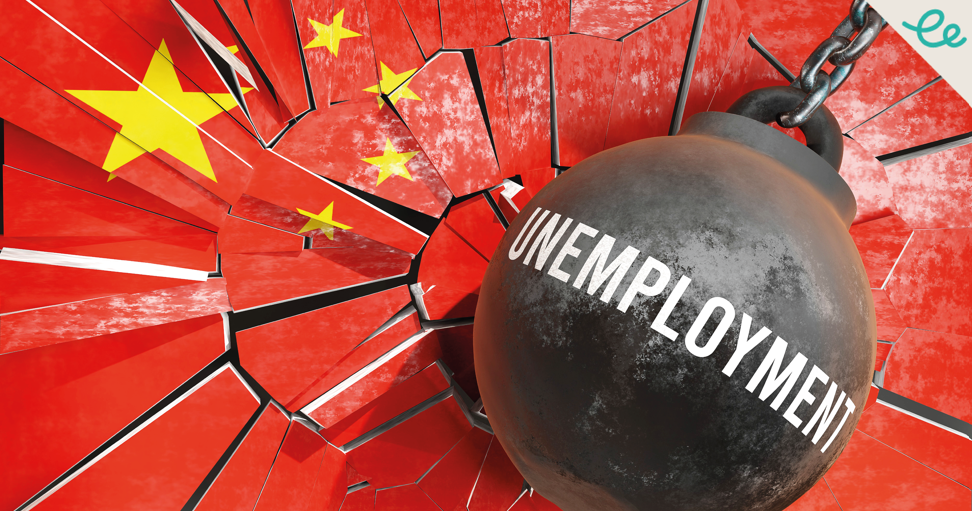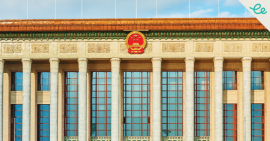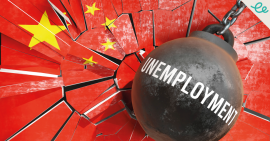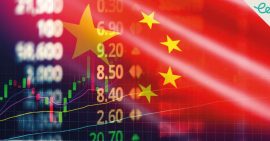Struggle to find jobs intensifies as China economy slows
The rotten-tail kids are lying flat in the garbage time of history. It doesn’t sound good because it isn’t good. As a record number of graduates looked for jobs this summer, China’s youth unemployment rate soared above 17% in July. Young Chinese are taking relief in social media buzzwords highlighting the deep economic and social problems that authorities try to mask with censorship and statistical tweaks.
The jobless rate for people aged 16 to 24, a politically sensitive figure in China, hit 21.3% in June 2023. This was a record high. And the rate was expected to worsen in July. So Beijing stopped publishing the numbers. They only restarted in January 2024 with a new measurement method. This produced a more acceptable 14.9% rate for December.
The episode deepened worries about the ruling Communist Party’s predilection for trying to boost confidence by withholding negative economic information. The July 2024 figure, 17.1%, marks the highest level under the new system of record-keeping. Graduation season partly explains the jump from 13.2% in June, as a record 11.8m students graduated this year. They enter the job market at a time of slowing economic growth and rising public despair.
If you want to learn more about Enodo’s analysis of this topic, and better understand the potential impact on your world, register for a FREE trial access to our comprehensive research service by clicking the button below.
“Rotten-tail kids”
As unemployment climbs, millions of college graduates are being pushed into a tough bargain, reported Reuters. Some are forced to accept low-paying work or subsist on parents’ pensions. This plight has created a new working class of “rotten-tail kids. The Gen Z phrase for something started but not properly finished borrows from the catchword “rotten-tail buildings.” This term is used for the tens of millions of unfinished homes that have plagued China’s economy since 2021.
The concept follows another term which took root that year, of China’s disillusioned youth “lying flat” and chilling. They prefer this to following their parents into a life of hard work and sacrifice. Ever wary of perceived threats to social stability (and its monopoly on power), the Party moved to squash the concept.
In recent months, censors have targeted another viral and undeniably pessimistic phrase, “the garbage time of history”. This made-in-China phrase uses a term from basketball—the ragged final minutes when a game’s outcome is no longer in doubt. It has become a heavily censored online discussion about whether China’s workers and investors should give up. State-run newspapers have, unsurprisingly, denounced the refrain as an attempt to smear China.
Xi sweetens his words
In May 2023, Xi Jinping told young people in China struggling to get a job that they should “eat bitterness” and endure character-building hardship, just like he did in the caves of central China as a youth from 1969-75. This May, Xi changed his tune and ordered the Politburo leadership group to prioritise youth employment. He emphasised the provision of “high-quality, full” youth employment as an economic priority, directing more resources to job creation.
From endurance to employment
China’s leaders are focused on economic revival, but they are also concerned about appeasing the young. This reflects unease about the potential of youth as troublemakers. Key inflection points in modern history, where China’s youth played a pivotal role, include the May 4th movement (1919), when students sparked a national reform movement, the Cultural Revolution (1966-76) and the Tiananmen Square demos (1989).
Today, beyond the nationalist card, the Party struggles to offer a compelling vision for China’s youth. After years of studying hard, under intense parental and societal pressure to enter the best college, many resent the shrinking array of career opportunities compared to previous generations who grew up in times of faster economic growth.
Peter Hessler, a chronicler of China and occasional teacher there since 1996, calls his students from the mid-1990s the “reform generation”, who believed in competition and were largely rewarded for their hard work. His students from the 2020s, the “Xi generation,” are also willing to work hard, but have few illusions about the system or their own future, noted The New York Times’ Li Yuan in a review of Hessler’s latest book Other Rivers.
The two characters they most identified with from George Orwell’s Animal Farm were the sceptical donkey, who keeps his thoughts to himself, and the blindly loyal horse. “Young people are increasingly dissatisfied, he said, but they are not ready to try to initiate a change,” wrote Li. “They know the price people pay for defying the system, and the payoff for going along – even as the payoffs are becoming harder to come by.”
Get a job – as an unemployment influencer
He Ajun quit the education industry last August due to Xi’s crackdown on private tutoring. This was one of several regulatory campaigns against thriving sectors, including tech and finance. These measures depressed a labour market already hit by Covid-induced disruptions. So the Guangzhou-based vlogger, 32, found an unlikely second life as an unemployment influencer, reported Reuters.
He advises grads to lower their ambitions. “If we have indeed entered ‘garbage time’, then I think young people could accumulate skills or do something creative, such as selling things via social media or making handicrafts.” Sociologist Yao Lu estimates about 25% of college graduates aged 23-35 are currently in jobs below their academic qualifications.
Many of China’s nearly 48m university students are likely to have poor starting salaries and contribute relatively little in taxes throughout their lifetimes, said one Chinese economist, who added: “Although they cannot be called a ‘lost generation’, it is a huge waste of human capital.”
Find your future in a high-tech superpower
The long awaited third plenum of the Party’s Central Committee in July was a twice-decade conclave that’s often heralded major policy shifts. This time, Xi stuck with the slow program of institutional reform in support of tech-innovation that has his calling card. Xi wants more investment in advanced manufacturing, dubbed “new quality productive forces” in Party parlance, to defy US curbs and make China a high-tech, self-sufficient superpower.
Further crackdowns on “negative” memes that describe economic malaise will remind young workers they should leave politics and power to the Party, and reap the rewards of this economic transition away from low-cost production to focus on innovation, digital technology and the domestic market.
The tech revolution threatens to shrink the job market further. China’s robot drive and frequent exhibitions raise the spectre of human obsolescence. Humanoid robots are set to be cheaper to hire than graduates. But at least this trend spells jobs in the short-term. Tesla is hiring workers to walk seven hours a day in motion-capture suits, to train robots. And the full takeover remains some way off. “I believe that it is likely to be at least 20 to 30 years before humanoid robots can achieve large-scale commercial application,” one tech analyst told Reuters.
If you want to learn more about Enodo’s analysis of this topic, and better understand the potential impact on your world, register for a FREE trial access to our comprehensive research service by clicking the button below.
Related Report:
Beijing Buries Bad News – But Can’t Make China Crisis Disappear









